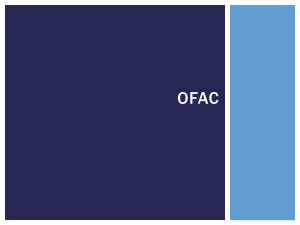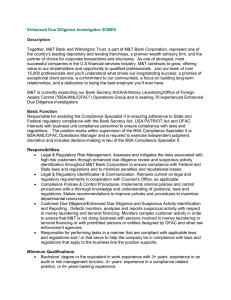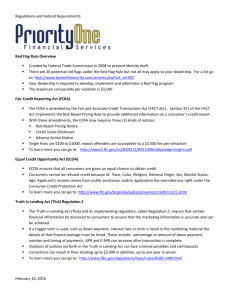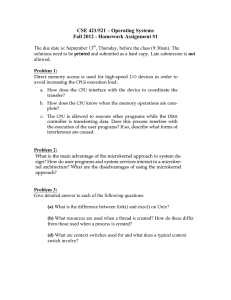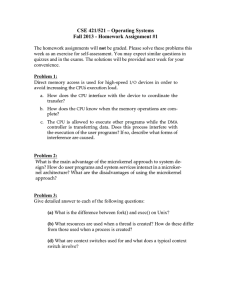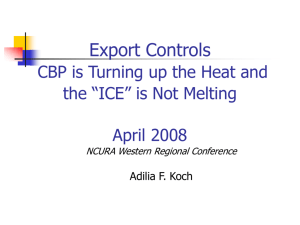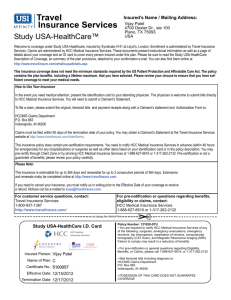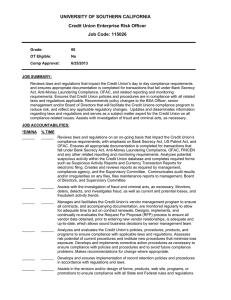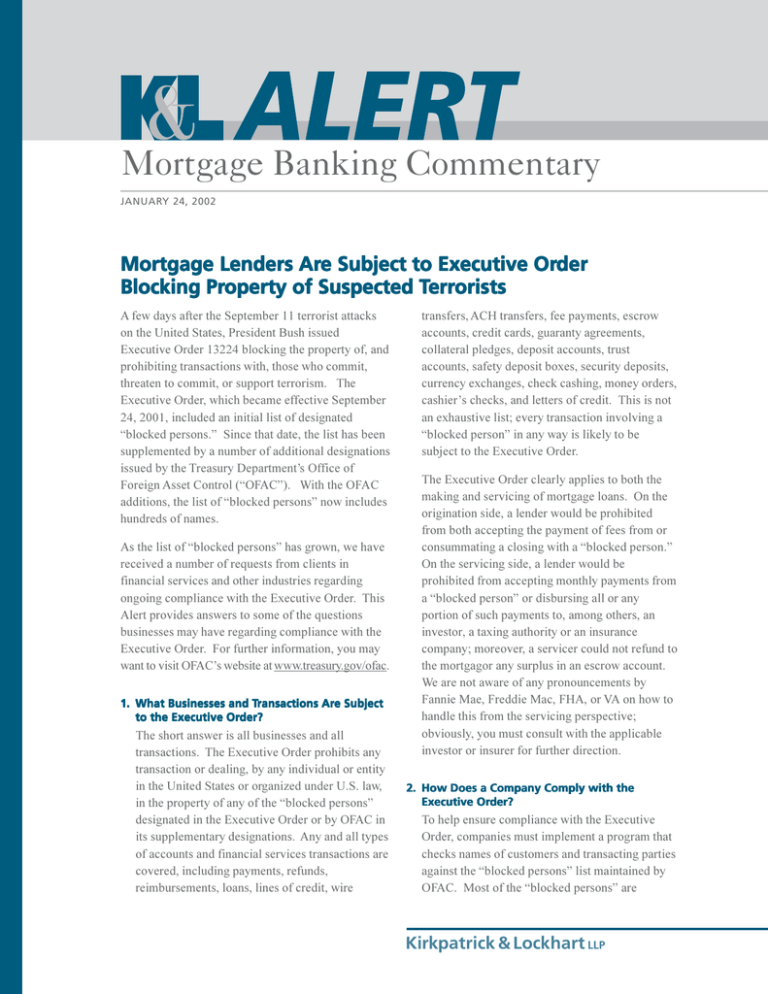
Mortgage Banking Commentary
JANUARY 24, 2002
Mor
tgage Lenders Ar
e Subject to Executive Or
der
Mortgage
Are
Order
Blocking Pr
oper
ty of Suspected T
er
Proper
operty
Ter
errrorists
A few days after the September 11 terrorist attacks
on the United States, President Bush issued
Executive Order 13224 blocking the property of, and
prohibiting transactions with, those who commit,
threaten to commit, or support terrorism. The
Executive Order, which became effective September
24, 2001, included an initial list of designated
blocked persons. Since that date, the list has been
supplemented by a number of additional designations
issued by the Treasury Departments Office of
Foreign Asset Control (OFAC). With the OFAC
additions, the list of blocked persons now includes
hundreds of names.
As the list of blocked persons has grown, we have
received a number of requests from clients in
financial services and other industries regarding
ongoing compliance with the Executive Order. This
Alert provides answers to some of the questions
businesses may have regarding compliance with the
Executive Order. For further information, you may
want to visit OFACs website at www.treasury.gov/ofac.
1. What Businesses and T
ransactions Ar
e Subject
Transactions
Are
to the Executive Or
der?
Order?
The short answer is all businesses and all
transactions. The Executive Order prohibits any
transaction or dealing, by any individual or entity
in the United States or organized under U.S. law,
in the property of any of the blocked persons
designated in the Executive Order or by OFAC in
its supplementary designations. Any and all types
of accounts and financial services transactions are
covered, including payments, refunds,
reimbursements, loans, lines of credit, wire
transfers, ACH transfers, fee payments, escrow
accounts, credit cards, guaranty agreements,
collateral pledges, deposit accounts, trust
accounts, safety deposit boxes, security deposits,
currency exchanges, check cashing, money orders,
cashiers checks, and letters of credit. This is not
an exhaustive list; every transaction involving a
blocked person in any way is likely to be
subject to the Executive Order.
The Executive Order clearly applies to both the
making and servicing of mortgage loans. On the
origination side, a lender would be prohibited
from both accepting the payment of fees from or
consummating a closing with a blocked person.
On the servicing side, a lender would be
prohibited from accepting monthly payments from
a blocked person or disbursing all or any
portion of such payments to, among others, an
investor, a taxing authority or an insurance
company; moreover, a servicer could not refund to
the mortgagor any surplus in an escrow account.
We are not aware of any pronouncements by
Fannie Mae, Freddie Mac, FHA, or VA on how to
handle this from the servicing perspective;
obviously, you must consult with the applicable
investor or insurer for further direction.
2. How Does a Company Comply with the
Executive Or
der?
Order?
To help ensure compliance with the Executive
Order, companies must implement a program that
checks names of customers and transacting parties
against the blocked persons list maintained by
OFAC. Most of the blocked persons are
Kirkpatrick & Lockhart LLP
foreigners, and many of them may not be
engaging in transactions in the United States or
with branches of U.S. entities located abroad.
Nevertheless, a business that fails to check names
of customers and all parties involved in
transactions against the list of blocked persons
does so at the risk of violating the Executive
Order. Checking names against the OFAC list
becomes even more critical as the number of
entities designated on the list, and consequently
the possibility that businesses may be interacting
with these blocked persons, increases over time.
Because of this, customer databases should be
rechecked immediately each time OFAC issues a
supplement to the list of blocked persons
identified in the Executive Order. Also, in
performing the name checking function,
companies need to remember to check the names
of all parties to a transaction or who may
participate in or benefit financially from the
transaction, including cosigners, guarantors and
beneficiaries.
3. How Can Names Be Checked Ef
fectively and
Effectively
Ef
ficiently?
Efficiently?
As a general matter, the most effective and
efficient name checks are likely to be those done
with software programs that check customer
names and the names of transacting parties against
a database of the blocked person names on the
OFAC list. The checking could be done manually,
but with hundreds of names currently on the
OFAC list, a manual check of each customer and
transaction is likely to be costly and time
consuming, and perhaps more subject to human
error. Depending on the type of transaction,
vendors or third parties that provide value-added
or supporting services in connection with the
transaction may be able to provide the name
check as part of the services they provide. For
example, in the mortgage lending industry, a
credit reporting agency might provide the name
checking service as part of the credit reporting
service; of course, this may not help if a lender
cannot accept an up-front credit report fee from
the borrower, nor does it help on the servicing
side. We are also aware that some companies
offer software programs to assist businesses in
checking customer and transacting party names
and in rechecking names as the OFAC list is
updated. Though it certainly makes sense to
avoid reinventing the wheel in this area, before
relying on a vendors or third partys name
checking service or software, a company should
take reasonable steps to determine whether the
service or software is reliable and effective.
4. What Should Be Done If a Name Check Reveals
a Match?
First, temporarily block assets or refrain from
entering into a transaction for as long as needed to
determine whether the match is real or a false
positive, and notify the customer or transacting
party of the situation. A false positive occurs
when a customer or transacting party has the same
name as a person on the OFAC list but is not that
person. Given the number of names on the OFAC
list, and the possible variations of spelling of
many of the names, there are likely to be false
positives from time to time. Where a false
positive is suspected, a company should
undertake sufficient due diligence to satisfy itself
that the customer or transacting party in question
is not in fact the blocked person on the OFAC
list with the same name. Since many, if not all, of
the individuals designated on the OFAC list are
foreigners who do not reside legally in the United
States, the due diligence could include obtaining a
copy of a birth certificate and/or of proof of U.S.
residency or citizenship. In addition, a company
may want to obtain an affidavit from the customer
or transacting party in question to the effect that
he or she is not the person of the same name
designated on the OFAC list. If questions remain
about whether a name match is a false positive
or a true match, contact OFAC at 1-800-540-6322
or 202-642-2290.
5. What Should Be Done with a T
Trrue Name
Match?
If a company determines that it has a true match
between one of its customers or transacting parties
and a name on OFACs blocked persons list, the
company must refuse to engage in any proposed
transaction with the person or, if the company
already has possession of the persons assets, the
company must block the assets so that no funds or
assets can be withdrawn. Obviously, ECOA/Fair
Kirkpatrick & Lockhart LLP
2
Housing issues arise if one were to refuse to
accept an application because of a match with the
OFAC list, but we believe the compelling business
necessity of complying with the Executive Order
should prevail if challenged. Any company that
blocks assets or refuses to engage in transactions
pursuant to the Executive Order is required to
report such action to OFAC by fax within 10 days
(OFACs fax number is 202-622-1657), but we
suggest companies contact OFAC as soon as
possible after determining the existence of a true
match between a customer or transacting party
and a blocked person on OFACs list. Any
company that blocks assets pursuant to the
Executive Order is required to file an annual
report, by September 30 of each year, regarding
the blocked assets. The form of such report, and
other information regarding the report, is available
at OFACs website at www.treasury.gov/ofac.
6. What Ar
e the Penalties for V
iolations of the
Are
Violations
Executive Or
der?
Order?
Federal law imposes both civil and criminal
penalties for violations of the Executive Order.
Criminal penalties for companies can range up to
$500,000 per violation. Criminal penalties for
individuals can range up to $250,000 per violation
and/or 10 years in jail. Civil penalties of up to
$11,000 per violation may be imposed
administratively against companies and
individuals violating the Executive Order. Some
of the factors the government is likely to consider
in determining whether to seek civil or criminal
penalties, and in determining the amount of such
penalties, against a company and its management
for violations of the Executive Order include
(1) the nature of the compliance program, if any,
adopted by the company to help ensure
compliance with the Executive Order and (2) the
amount of education and training, if any, the
company has provided employees regarding
compliance procedures.
7. What Else Can Be Done to Help Ensur
e
Ensure
Compliance?
As indicated above, a factor the government may
take into consideration when determining whether
to impose civil or criminal penalties for a
violation of the Executive Order is the nature and
extent of a companys internal compliance efforts.
All companies, and particularly those in financial
services industries, should address the importance
of compliance with the Executive Order in their
policy and procedures manuals, and they should
train and educate employees in the use of
compliance procedures. Also, as indicated above,
companies should be sure to use, and to document
their use of, a reliable name checking program or
service on a regular basis, and they should keep
written records of all matches and false
positives and how they are handled and resolved.
In summary, the Executive Order blocking assets
and prohibiting transactions with terrorists and
those who threaten or support terrorist activities
applies to (1) all people and businesses in the
United States, (2) all assets of the blocked
persons identified in the Executive Order and by
OFAC on supplemental lists, and (3) all
transactions involving any assets of the blocked
persons. All companies, and especially those in
financial services industries, need to implement
programs to help ensure their compliance with the
Executive Order.
*
*
*
*
*
This newsletter is for informational purposes only.
Nothing herein is intended or should be construed as
legal advice or a legal opinion applicable to any
particular set of facts or to any individuals or
entitys general or specific circumstances.
If you have any questions about the Executive Order
or your compliance with it, please contact Bruce
Nielson at 202-778-9256 or any of the attorneys of
K&Ls Mortgage Banking/Consumer Finance Group.
Kirkpatrick & Lockhart LLP
3
MORTGAGE BANKING/CONSUMER FINANCE GROUP
Kirkpatrick & Lockhart LLP was founded in 1946, and, with more than 650 lawyers, is one of the 50 largest law firms in the
United States. K&L attorneys are based in ten offices in key U.S. cities Boston, Dallas, Harrisburg, Los Angeles, Miami,
Newark, New York, Pittsburgh, San Francisco, and Washington. Our firm represents a broad range of clients in a wide variety
of matters, including corporate and securities, e-commerce, investment management, insurance coverage, financial institutions,
mortgage banking and consumer finance, creditors rights, intellectual property, tax, labor, environmental, antitrust, health care,
and government contracts. More than half our attorneys are litigators. We litigate class actions on a range of financial issues,
generally defending financial institutions, broker-dealers, public companies, and investment companies and their officers and
directors against claims of violations of securities laws, consumer credit laws, and common law tort and contract claims. You
can learn more about our firm by visiting our Internet website at www.kl.com.
The Mortgage Banking/Consumer Finance Group provides legal advice and licensing services to the consumer lending industry.
We counsel clients engaged in the full range of mortgage banking activities, including the origination, processing, underwriting,
closing, funding, insuring, selling, and servicing of residential mortgage loans and consumer loans, from both a transactional
and regulatory compliance perspective. Our focus includes both first- and subordinate-lien residential mortgage loans, as well
as open-end home equity, property improvement loans and other forms of consumer loans. We also have experience in multifamily and commercial mortgage loans. Our clients include mortgage companies, depository institutions, consumer finance
companies, investment bankers, insurance companies, real estate agencies, homebuilders, and venture capital funds. Members
of the Mortgage Banking/Consumer Finance Group and their telephone numbers and e-mail addresses are listed below:
ATTORNEYS
Laurence E. Platt
Phillip L. Schulman
Thomas J. Noto
Costas A. Avrakotos
Melanie Hibbs Brody
Irene C. Freidel
Jonathan Jaffe
R. Bruce Allensworth
Daniel J. Tobin
Anthony P. La Rocco
Emily J. Booth
Eric J. Edwardson
Suzanne F. Garwood
Tara Goebel
Steven M. Kaplan
Kristie D. Kully
Krista Patterson
Carol M. Tomaszczuk
Nanci L. Weissgold
(202) 7789034
(202) 7789027
(202) 7789114
(202) 7789075
(202) 7789203
(617) 2613115
(415) 2491023
(617) 2613119
(202) 7789074
(973) 8484014
(202) 7789112
(202) 7789387
(202) 7789892
(202) 7789261
(202) 7789204
(202) 7789301
(202) 7789257
(202) 7789206
(202) 7789314
lplatt@kl.com
pschulman@kl.com
tnoto@kl.com
cavrakotos@kl.com
mbrody@kl.com
ifreidel@kl.com
jjaffe@kl.com
ballensworth@kl.com
dtobin@kl.com
alarocco@kl.com
ebooth@kl.com
eedwardson@kl.com
sgarwood@kl.com
tgoebel@kl.com
skaplan@kl.com
kkully@kl.com
kpatterson@kl.com
ctomaszczuk@kl.com
nweissgold@kl.com
DIRECTOR OF LICENSING
Stacey L. Riggin
(202) 7789202 sriggin@kl.com
REGULATORY COMPLIANCE ANALYSTS
Dana L. Lopez
(202) 7789383 dlopez@kl.com
Nancy J. Butler
(202) 7789374 nbutler@kl.com
Susan C. Curtin
(202) 7789129 scurtin@kl.com
Joelle Myers
(202) 7789093 jmyers@kl.com
Marguerite T. Frampton (202) 7789253 mframpton@kl.com
Jeffrey Prost
(202) 7789364 jprost@kl.com
Sharon L. OBrien
(202) 778-9859 sobrien@kl.com
LAW CLERKS
Mera C. Choi
(202) 7789415 mchoi@kl.com
SM
Kirkpatrick & Lockhart LLP
Challenge us.
SM
BOSTON
n
DALLAS
n
HARRISBURG
n
LOS ANGELES
n
MIAMI
n
NEWARK
n
NEW YORK
n
PITTSBURGH
n
SAN FRANCISCO
n
WASHINGTON
...........................................................................................................................................................
This publication/newsletter is for informational purposes and does not contain or convey legal advice. The information herein
should not be used or relied upon in regard to any particular facts or circumstances without first consulting with a lawyer.
© 2002 KIRKPATRICK & LOCKHART LLP.
ALL RIGHTS RESERVED.

